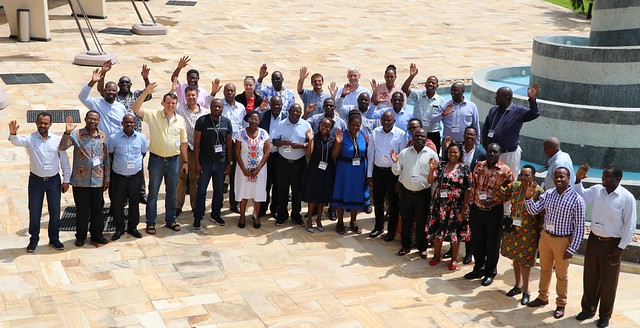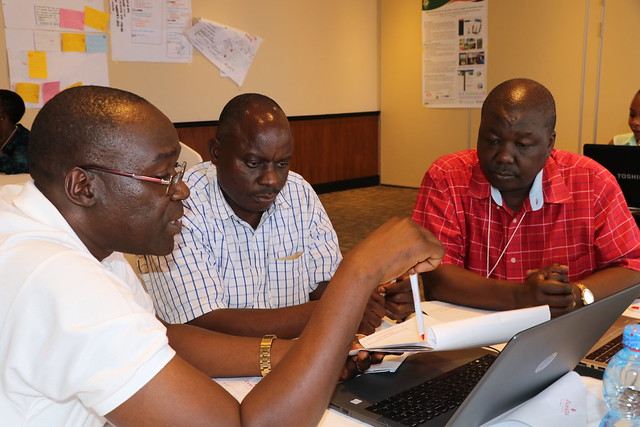Filling the missing pieces: ESA partners set targets for collating sustainable intensification data

Earlier this month (10–11 September 2019), the Africa RISING project in East and Southern Africa (ESA) held its annual review and planning meeting in Dar es Salaam, Tanzania, bringing together 45 project partners from various CGIAR centres, national agricultural research centres, universities, and the development sector. Top on the meeting’s agenda, was a review of the project implementation and discussing the next cycle of activity plans for 2019/2020.
In a bid consolidate the project’s systems research outputs and effectively assess the sustainable intensification qualities of technologies validated over the past seven years, partners used a new approach to review and plan in this year’s meeting.
Unlike past meetings where each partner would report on ‘their’ sub-activity, which they were responsible for (mostly reporting productivity and economic domains); in this meeting partners had to showcase the ‘collective/systems’ contributions and inherent trade-offs emerging from different sub-activities and how they each contributed to the broader farming system transformation and the sustainable intensification data gathered so far. The goal was to provide a synthesis of the early narrative about the role played by the various project interventions in sustainably intensifying smallholder farms.

‘We opted to go for this approach because we believe it will help us to tighten up the farming systems research reporting of our outputs. We will also be able (from this) to see where there are data gaps that need to be filled to ensure that we have data for are all domains represented in the SIAF,’ noted Bekunda Mateete, Africa RISING ESA project chief scientist.
Partner presentations during the meeting were organized around four teams which represented case studies cutting across different subactivities at field, farm, household and landscape levels.
- Integrated soil fertility management-based systems in Tanzania – presented by Job Kihara of the International Center for Tropical Agriculture (CIAT).
- Intensifying legume/cereal cropping systems in Malawi – presented by Regis Chikowo of Michigan State University.
- Integrated livestock feed innovations – presented by Ben Lukuyu of the International Livestock Research Institute (ILRI).
- Farm level systems case studies in Tanzania – presented by Lieven Claessens of the International Institute of Tropical Agriculture (IITA).
- Maize-legume intensification case studies from Malawi – presented by Munyaradzi Mutenje of the International Maize and Wheat Improvement Center (CIMMYT).
Four posters highlighting interventions that would help extend Africa RISING’s validated technologies beyond the current activity sites were also presented:
- FarmMATCH: Matching agricultural technologies to context and household – presented by Jeroen Groot of Wageningen University.
- Digital transformation of agriculture: A game changer for sub-Saharan Africa – presented by Haroon Sseguya of IITA.
- Spatial assessment of land degradation in semi-arid zone of central Tanzania – presented by Francis Muthoni of IITA.
- Quantifying trends of rainfall and temperature extremes over Central Tanzania to guide targeting of climate smart technologies – presented by Francis Muthoni.

It was clear from all the presentations that there was abundant data already collected on two (productivity and economics) of the five sustainable intensification domains. It was also obvious that there was immense need for partners to double down on collecting data on the environment, human, and social domains to give the country teams a complete picture of how different interventions were transforming the farming system.
‘This project is unique as it integrates various partners and activities in an integrated approach. But this unique trait also creates a challenge in tying up all the piece together in a single narrative. As partners, we need to keep on aiming to integrate our work plans and activities so that we have a clearer picture of our systems research for agriculture achievements,’ noted Victor Manyong, chair, Africa RISING ESA steering committee and director IITA Eastern Africa Hub.
Other salient issues emerging from discussions at the meeting touched on data management and monitoring and evaluation. Partners committed to continue uploading data to the Dataverse project as required with the chief scientist Mateete emphasizing that this will be an important criterion for subsequent funding to partners in the coming year. Partners also explored how best to ensure that all data uploaded to Dataverse is linked back to specific subactivities /projects. It was resolved that the principal investigators (PI’s) for each project would be responsible for data uploads as opposed to all individual scientist involved with that project uploading ‘their’ data from personal accounts.
The submission of monitoring and evaluation (M&E) data for upload to the Feed the Future Monitoring System (FTFMS) was also discussed at length with the M&E team emphasizing the need for timely submission of this data. An internal (project) deadline for submitting the 2018/2019 data was set for 30 September 2019.
Representing the director general of the Tanzania Agriculture Research Institute (TARI), Everest Makene applauded the partners’ collaboration within the project noting that this was an important element for implementing integrated activities in the coming year. He further noted that by going beyond commodity/single crop focus into livestock productivity and backing all this up with research, Africa RISING was addressing the reality of how smallholder farmers actually operate – practicing mixed farming – and this makes the project’s outputs very wholistic.
Makene closed the meeting by commending the project team for a participatory and well-organized review and planning meeting.
‘Missing pieces do more than complete the puzzle, they fill in an empty space.’
Luanne Rice




